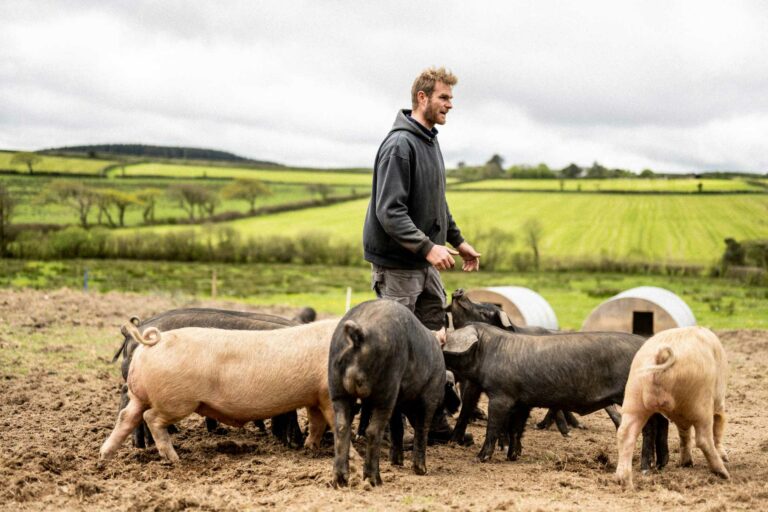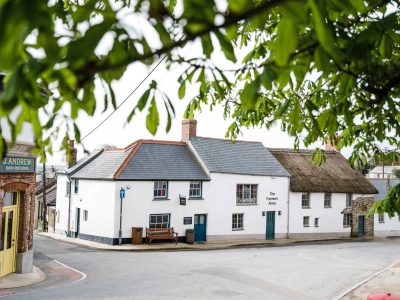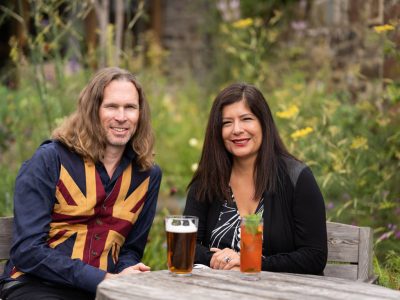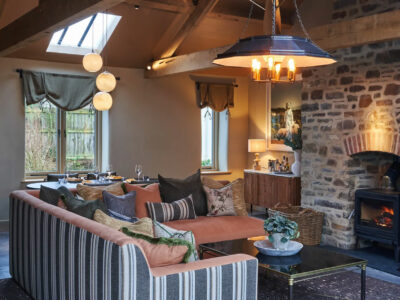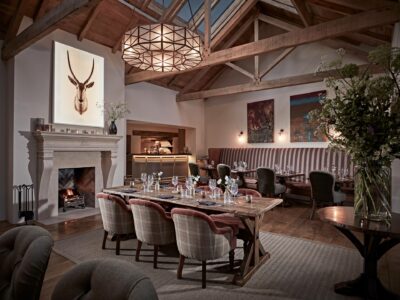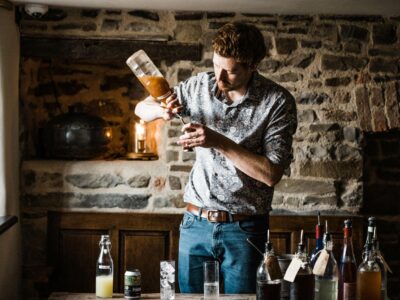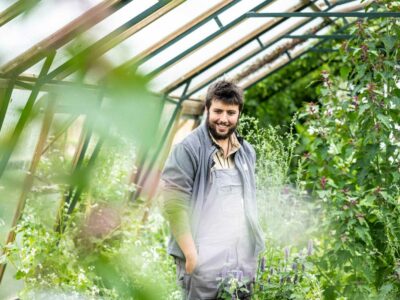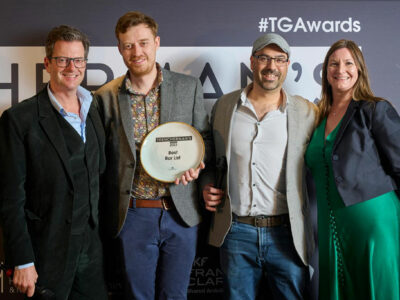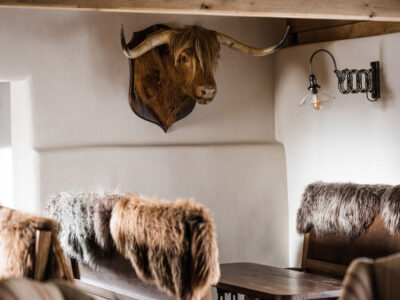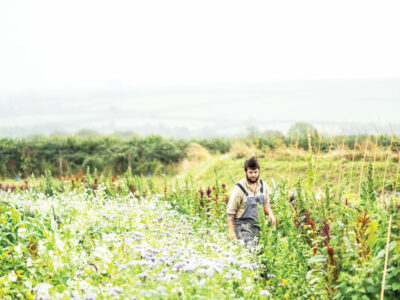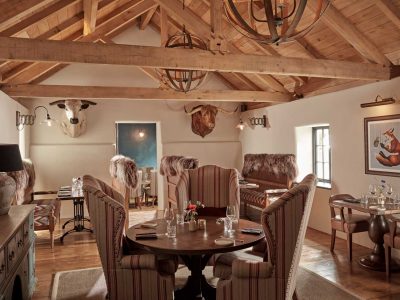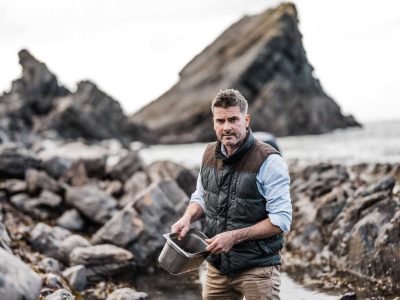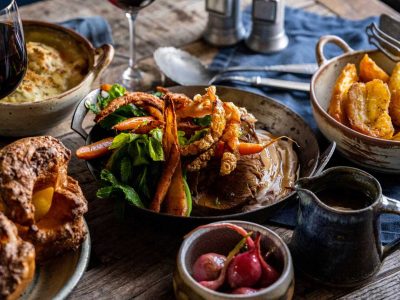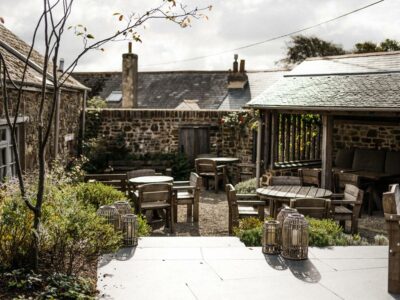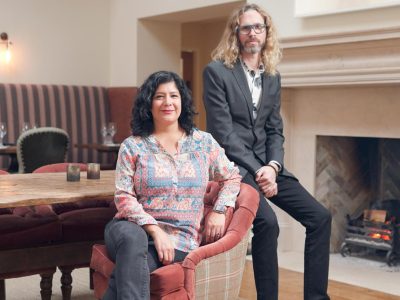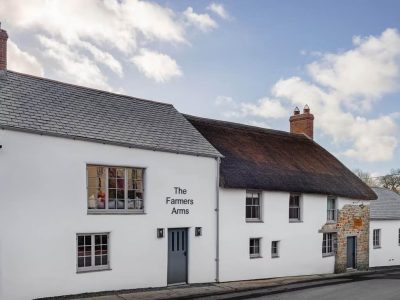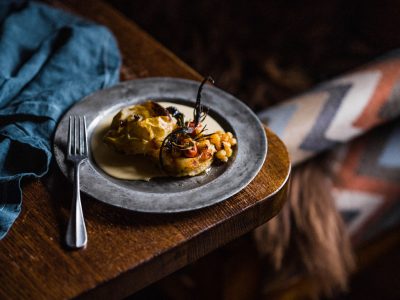Martin Hesp reveals how one foodie couple are transforming a North Devon village
New venues offering food and drink set up all the time across the region and most fall into the obvious categories, ranging from cut-price cafes to high-end restaurants. But there’s a story emerging in North Devon which is in a league of its own – indeed, in more than 20 years of writing about such things, I have never reported on anything like it.
It is called the Collective at Woolsery, so let me spell out the basics of its evolution so that you can see what a very remarkable, and promising, story this is.
First we must imagine a village which, like so many rural communities, was struggling a little as the nation’s demographics shift and change. The pub had closed, the village shop looks in danger of going the same way and several buildings at the heart of the community are empty and no longer functioning.
Now we jump 5,000 miles to San Francisco where a man who has strong Devon roots is living with his wife and three children. The man’s sister phones to tell him about the plight of the pub and the village shop which was built by his great-grandfather – and, because he and his wife have done well financially from the dot-com boom, she suggests they maybe able to do something to help.
The couple visit Woolfardisworthy (to give the village its proper spelling) and do indeed purchase the pub and the shop, and also a fish-and-chip business. They also purchase a large old house and several cottages in the village centre.
But this is no ordinary story where a developer moves in to make a fast buck. Silicon Valley tech-entrepreneurs Michael and Xochi Birch felt compelled to save the 350-year-old Farmers Arms and the village shop in a bid to bring life into the village where he spent so many of his boyhood summers.
“When I was a child we would visit Devon every Easter and summer with our family,” says Michael. “Although my grandmother had moved to Bideford, her brother Cyril still lived in the village – so I looked forward to our trips there and I would hear all about our family connections – how my great-grandfather had built the shop and how the graveyard was full of distant relatives.”
It was the purchase of the big house – which at one time had been a hotel – that really began to crystallise a vision for Michael and Xochi. They realised that Wulfheard Manor could be turned into a luxury boutique hotel with a difference. Most are situated in private grounds outside any kind of settlement – this one, located in the heart of a village, would become an integral part of the community. Visitors who stay at the manor (when the conversion is complete) will be able to rub shoulders with locals at the pub opposite and generally feel part of the village.
The same applies to visitors in the amazing suites which the couple have created above the refurbished village shop and in several cottages around the village centre.
So much for the basic business model, but these are food pages and we must explain why this story could become so important in the region’s food and drink scene…
Having become so excited by the project, Michael and Xochi went on to purchase what amounts to a 150-acre farm (now called Birch Farm) on the outskirts of Woolsery. The idea is that by using organic and regenerative techniques the farm will be able to supply the pub, the shop and the hotel (there’s also a new village bakery under construction) with a large proportion of the meat, vegetables, herbs, eggs and other essentials required.
Sustainability is at the heart of everything at the Collective at Woolsery, but this is no ordinary situation where a pub or hotel has a bit of a garden and a few pigs or sheep. The team working on the project are experts and they are thinking big.
Michael and Xochi brought their friend and colleague Emily Harmon from California to oversee the project as managing director – and you’ll meet very few people indeed who have the energy and foresight that Emily has for what is an extremely complex and all-embracing masterplan.
Apart from anything else, Emily is a diplomat. She realised when she moved in eight years ago that such a major plan taking place in one small village would have a delicate road to tread when it came to building relationships with local people. The Collective has bent over backwards to both listen to and involve villagers – indeed, the business employs more than 70 local people at present.
It has also hired a top team to oversee the gardens evolution of the food offering. You only have to stroll around the extraordinary gardens which make up the horticultural element of the farm to see that head gardener Josh Sparkes is a man on a mission to do things differently. He has amassed experience at various high-profile gardens and has been on prestigious scholarships to America and Japan – now he is incorporating all manner of agro-forestry and regenerative techniques on the farm and the regime is already paying dividends.
We also met livestock manager, local farmer Chris Jenn, who took us on a tour of the farm’s Dartmoor white-faced sheep and Red Devon cattle – we also saw happy-looking pigs and chickens.
So good and sustainable raw ingredients are already coming out of the farm, which of course delights the chef. And Ian Webber is no ordinary executive chef. Having worked at places like Gidleigh Park and other top country house hotels in this country and abroad, he is a man with an immense vision.
“When we met for the first time, we got on like a house on fire,” Emily explained as we sat down to a memorable meal prepared by Ian at The Farmers Arms. “We knew we talked the same language as far as what we wanted to do. He knows the county – he knows what’s here and he has a passion for foraging and farming. So it has been a great marriage with him and the farm and Josh the farmer. As soon as Ian came in, it all just fell into place.”
Emily explained that the ethos at The Farmers Arms harks back to an older age of pub food. “What we wanted to do was make it the pub food pre-1960 or 1950. Real pub food. Back then what you had were travellers’ inns where you stopped to eat and drink – old inns that go way back to horses and carriages and beyond. They weren’t importing things from anywhere. They were serving what was actually the local fare. The stuff that was available. That is what we decided we wanted to focus on. Now we raise our own animals and grow our own food – and serve that style of food. It requires a lot more thinking and planning. It means the chef has to use all the animal. A lot of chefs just buy in steaks, full stop. Our chef must use everything. Ian likes to experiment and that’s brilliant. Any chef can serve a steak. But if you are using all that other stuff, you’ve got to use your brains, you have to think of dishes which people are going to come in and want to buy.”
Ian told me: “I believe in getting back to basics while bringing new techniques to the fore – but doing things in a way that maybe someone would have recognised a couple of hundred years ago. It’s about restoring our tradition and techniques that have been forgotten and lost, making sure that we look after those for future generations. We are now teaching those old techniques to our trainee chefs. We celebrate those things. They are intrinsically linked to the way we should be farming for the future and the way we did farm before we became set in our modern ways. So we’re trying to do things properly and rebuild things for how we’d like it to be in 20 years’ time. Or 50 or a 100 years’ time.”
Ian is a modest, quietly-spoken man who admits he has a big job on his hands. He is also happy to lavish praise on the likes of Josh and Chris. “It all starts with our farm – how the animals are raised and how the vegetables are grown. Through our edible forestry and Josh’s natural farming techniques, we try to support and celebrate nature – to actually give back to nature. We take what we need, but only what we need. No more than that. And we try and regenerate the earth – that land and its soil – and all the networks that go within that ecosystem. Josh is incredible. As is Chris – and we’re learning to rear animals better and produce a better life for them.
“But, of course, it’s also about quality produce. We are right at the beginning of our journey but we’re trying to make sure that we are systematic in the way we go about building this. It is a massive amount of work.”
I was hugely impressed by the lunch, dinner and breakfast I enjoyed last week at The Farmers Arms. The homemade charcuterie (some made from the farm’s hogget lamb) was incredible and so was the trio of roasted meats I had later at dinner. The glazed ham was so good at the next morning’s breakfast I persuaded Ian to share the recipe for the glaze.
Eventually Ian will oversee two head chefs – one at the pub and another at the forthcoming Wulfheard Manor – by then I truly believe food writers from far and wide will be making their way to the strangely named village out there on North Devon’s wild and beautiful windswept promontory.
